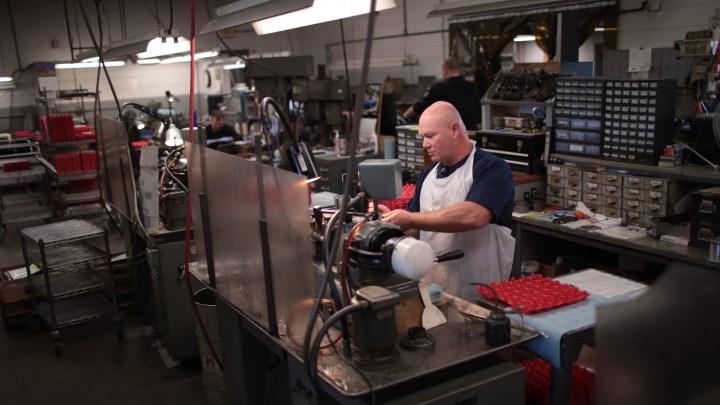
To satisfy demand, manufacturers are on a capital-goods spending spree
To satisfy demand, manufacturers are on a capital-goods spending spree

Durable goods numbers from the Commerce Department came out Wednesday — orders of things meant to last several years, like cars and computers. Orders were down 0.4% in September, thanks in large part to the ongoing supply chain situation.
At the same time, we learned that orders for capital goods, the equipment that manufacturers use to make things — think drill presses, electrical equipment, metalworking tools — hit a record high in September. That’s the seventh-straight monthly increase.
Manufacturers are ordering more capital goods because they’re trying to boost production.
“We’re just choked up here, we just can’t get enough product out,” said Tim Fiore with the Institute for Supply Management.
Fiore surveys manufacturers and said he’s seeing more respondents talk about buying equipment that will help them meet consumer demand for years.
“So there’s a lot of runway here, and it’s time that people reinvested in their equipment and facilities to address this demand and be ready for the next cycle,” he said.
New tools and machinery can also help a manufacturer get more efficient at a time when raw materials are hard to come by.
“Manufacturers were already doing that before the pandemic, and what we’ve seen is that firms have really doubled down on their investments,” said Chad Moutray, chief economist at the National Association of Manufacturers.
The companies could hire more workers if they’re looking to boost production — but not in this labor market, said George Pearkes at Bespoke Investment Group.
“Now, the thinking looks to be much more closer to, ‘I want to substitute away from labor because labor’s getting really expensive,'” he said.
As a result of all that new equipment, Pearkes said workers who are employed are getting more productive. And that’s a good sign for the economic recovery.
There’s a lot happening in the world. Through it all, Marketplace is here for you.
You rely on Marketplace to break down the world’s events and tell you how it affects you in a fact-based, approachable way. We rely on your financial support to keep making that possible.
Your donation today powers the independent journalism that you rely on. For just $5/month, you can help sustain Marketplace so we can keep reporting on the things that matter to you.

















